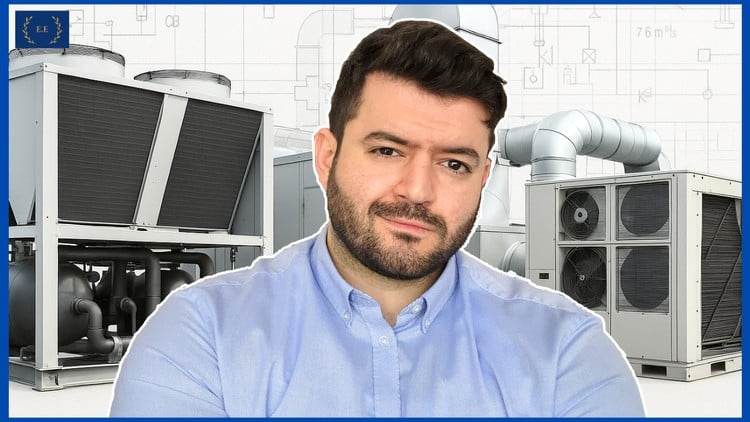
The Experts Guide to HVAC Engineering Design Principles Combining the Theory and the Practice within the HVAC Industry
⏱️ Length: 1.9 total hours
⭐ 4.37/5 rating
👥 13,436 students
🔄 May 2025 update
Add-On Information:
Note➛ Make sure your 𝐔𝐝𝐞𝐦𝐲 cart has only this course you're going to enroll it now, Remove all other courses from the 𝐔𝐝𝐞𝐦𝐲 cart before Enrolling!
- Course Overview
- Dive into the foundational pillars of HVAC (Heating, Ventilation, and Air Conditioning) engineering, equipping you with the essential theoretical knowledge to understand system operation and performance.
- Explore the critical factors influencing indoor environmental quality, including thermal comfort, air purity, and acoustic considerations, and learn how HVAC systems directly impact these.
- Gain a comprehensive understanding of psychrometrics, the science of air and moisture, and its pivotal role in analyzing and manipulating air properties for optimal building conditions.
- Uncover the intricate relationships between building envelopes and HVAC systems, recognizing how insulation, window performance, and air infiltration directly affect system sizing and efficiency.
- Understand the fundamental principles of heat transfer – conduction, convection, and radiation – and how they govern energy flow within building systems and the surrounding environment.
- Acquire knowledge of various HVAC system types, from traditional split systems to more complex centralized and distributed solutions, and their applicability in diverse building scenarios.
- Learn to interpret and utilize crucial building codes and standards that dictate minimum HVAC performance requirements, ensuring safety, efficiency, and compliance.
- Develop an appreciation for energy conservation measures within HVAC design, understanding how to implement strategies that reduce operational costs and environmental impact.
- Be introduced to the concept of load calculations, the cornerstone of proper HVAC system sizing, and the factors that contribute to heating and cooling demands.
- Understand the importance of air distribution and ductwork design in achieving uniform temperature and ventilation throughout a space, minimizing drafts and dead zones.
- Advanced Design Principles & Industry Best Practices
- Master the systematic approach to HVAC design, from initial concept and schematic development to detailed engineering drawings and specifications.
- Learn the art of selecting appropriate HVAC equipment based on project requirements, capacity, efficiency ratings, and lifecycle costs.
- Explore strategies for designing energy-efficient HVAC systems that go beyond minimum code requirements, leveraging advanced technologies and design techniques.
- Understand the principles of indoor air quality (IAQ) management and how to design systems that effectively filter, ventilate, and control airborne contaminants.
- Gain insights into the integration of HVAC systems with building automation systems (BAS) for enhanced control, monitoring, and optimization.
- Learn about the importance of system commissioning and testing, ensuring that installed HVAC systems perform as designed and meet project objectives.
- Discover best practices for noise control in HVAC systems, implementing strategies to minimize acoustic disturbance and ensure occupant comfort.
- Understand the role of sustainability and green building principles in HVAC design, including the use of renewable energy sources and low-impact materials.
- Explore considerations for resilient HVAC design, ensuring system functionality during extreme weather events or power outages.
- Acquire knowledge of emerging trends and technologies in HVAC design, such as smart ventilation, demand-controlled ventilation, and advanced refrigerants.
- Requirements / Prerequisites
- Basic understanding of mathematics, including algebra and geometry.
- Familiarity with general building construction concepts is beneficial but not strictly required.
- A willingness to learn and engage with technical concepts.
- No prior specialized HVAC knowledge is assumed.
- Skills Covered / Tools Used
- Load Calculation Techniques: Developing the ability to accurately determine heating and cooling loads.
- Psychrometric Analysis: Proficiency in using psychrometric charts and understanding air properties.
- System Selection: Competence in choosing appropriate HVAC equipment for various applications.
- Ductwork Sizing & Design: Understanding principles for efficient air distribution.
- Code Interpretation: Ability to navigate and apply relevant HVAC codes and standards.
- Energy Modeling Fundamentals: Introduction to concepts for assessing system efficiency.
- Problem-Solving: Developing analytical skills to address HVAC design challenges.
- Software Exposure (Conceptual): While no specific software is taught, an understanding of the types of tools used in professional HVAC design (e.g., load calculation software, BIM) will be fostered.
- Benefits / Outcomes
- Foundation for Further Study: Provides a strong bedrock for pursuing advanced HVAC certifications or specialized courses.
- Enhanced Project Comprehension: Ability to understand and contribute more effectively to HVAC-related discussions and projects.
- Improved Design Acumen: Develops the critical thinking needed to design efficient and effective HVAC solutions.
- Career Advancement: Opens doors to entry-level positions or enhances the capabilities of existing professionals in related fields.
- Cost Savings Awareness: Understand how thoughtful design directly translates to reduced operational and energy expenses.
- Contribution to Sustainable Design: Equip yourself to design systems that minimize environmental impact.
- Increased Confidence: Gain the assurance to tackle HVAC-related tasks and challenges.
- Valuable Industry Knowledge: Acquire practical insights that are highly sought after in the building services sector.
- Better Building Performance Understanding: Develop a holistic view of how HVAC systems interact with the entire building.
- Informed Decision-Making: Empowered to make sound choices regarding HVAC system design and implementation.
- PROS
- Comprehensive coverage of both theoretical fundamentals and practical design best practices.
- Provides a strong foundation for individuals new to the HVAC field.
- Up-to-date content with a recent May 2025 update, reflecting current industry standards.
- High student enrollment and a strong rating suggest effective instruction.
- Focus on essential calculations like U-Value, a core component of HVAC design.
- CONS
- The course is a concise 1.9 hours, which may limit the depth of coverage for highly complex topics.
Learning Tracks: English,Teaching & Academics,Engineering
Found It Free? Share It Fast!